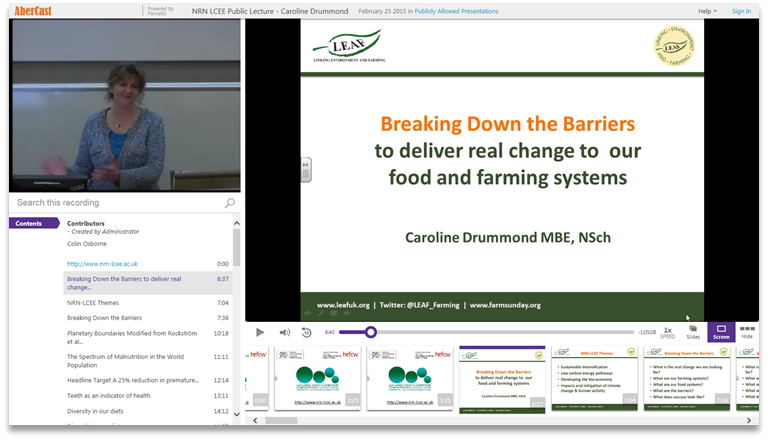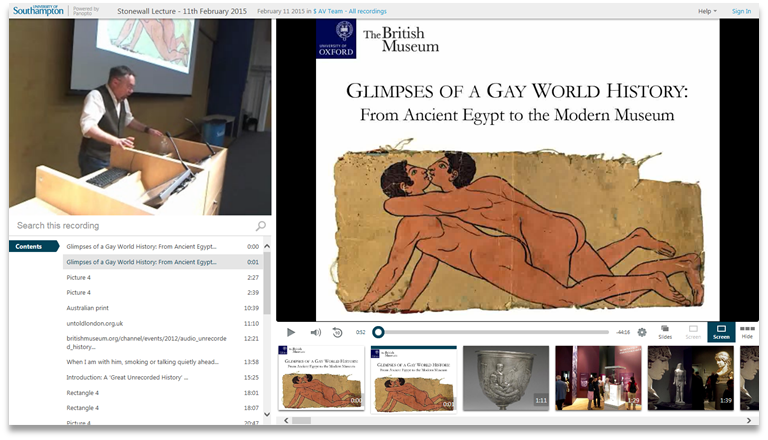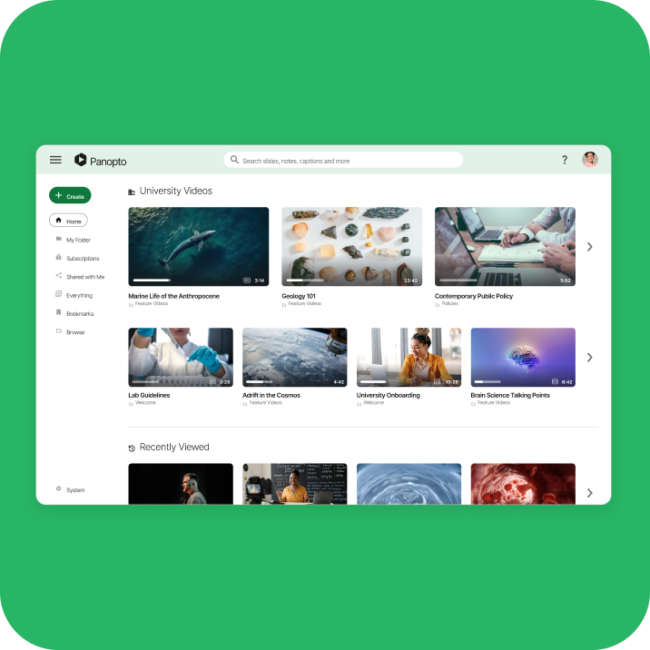- Uncategorized
This Week In Ideas Shared With Panopto — February 27, 2015
More than any other way we document ideas and information, PowerPoint slides have an incredibly short shelf life.
Sure, everyone’s now heard that the half life of a tweet can be measured in minutes, or that a Facebook post becomes history within the hour. But those are never more than headlines and musings — little quips never meant to produce anything more than a laugh or a click.
PowerPoint (and Keynote, Google Slides, and the rest as well) is supposed to be more meaningful than that. These are the tools meant to serve as both a persuasive case-maker AND supporting documentation — the single deliverable that includes all the little details that add up to the obvious conclusion. For many, “the deck” has even outright replaced more traditional written documentation, and is now the only tool used to really make a complete case or share an idea in detail.
Yet while slides have become our go-to tool for communicating in the moment, interestingly, the same technology just hasn’t caught on as a reference tool. No one ever asks to see the old PowerPoint slides until they’ve exhausted all the other avenues, having sifted through the seemingly worse options of old emails and documents. The slides themselves — the very centerpiece of your message when given — are overlooked.
Unless, of course, you’ve recorded them.
Recording even simple videos of your presentations has proven to be an effective means of making those slides interesting and engaging far longer. Want proof? Just look to YouTube, where keynotes, presentations, and town hall events from years ago still receive regular viewership, and conference sessions from conventions well in the past are still actively sought out for reference.
While the slide decks themselves have long been discarded, the ideas and information they presented become more valuable — and longer-lasting — when recorded and shared.
This week we saw more and more people taking advantage of the power of video to share ideas, send messages, and make a statement. And in the spirit of passing it on, these are just a few of the ideas shared this week with the Panopto video platform.

Breaking Down the Barriers to Deliver Real Change to Our Food and Farming Systems
Listen in with Caroline Drummond, Chief Executive of Linking Environment and Farming (LEAF) for this public lecture at Aberystwyth University. Drummond explores the challenges faced by our planet, the scientific community and wider society that need to be addressed in order to bring long lasting and meaningful changes to the sustainability of farming systems, how our food is produced and what we eat.

Marine Protected Areas Can Intensify Competition and Cooperation in Fishing Communities and Create ‘Spiteful Cooperator’ People
Duke University Assistant Professor Xavier Basurto looks into the practical history of marine protected areas in fishing communities, and how this regulatory designation produces both competition and cooperation among the members of the many and varied local groups touched by the political action. Ultimately, Basurto shows how the economic incentive to cooperate is greater than the competitive impulse.

125 Years of Steel Bridges in Britain
On completion of the Forth Railway Bridge in 1890, steel rapidly replaced wrought iron as the construction material of choice for bridges in Britain. Join Alan Hayward for this recorded keynote address as he traces the development of bridge types, construction methods, steel strengths and design practices, and describes the rebirth of steel bridges from the 1970s.

Legal Basics for Startups
Sit in with the students at the University of Washington’s Foster School of Business for this fascinating discussion on the when a startup business should seek help from an attorney. Guest speaker Bill Bromfield of Fenwick & West also joins the class to discuss the various legal issues startups face, and the seven ways entrepreneurs can derail their startup without legal guidance.

Glimpses of a Gay World History: From Ancient Egypt to the Modern Museum
The Southampton Stonewall Lecture is an annual lecture at the University of Southampton devoted to the history of homosexuality or LGBT history. The purpose of the lecture is to educate the present about the past and to showcase thinking and research about LGBT history. In this fourth edition of the lecture series, Professor Richard B Parkinson, Professor of Egyptology at the University of Oxford shares his research on same-sex desire in ancient Egyptian culture and literature, as well as the wider issue of how and why museums can represent same-sex experiences as integral parts of world cultures.

An Eclectic Account of Lay Morality and Charitable Giving
Join Dr Balihar Sanghera of the University of Kent for this examination of how charitable giving is an outcome of different interacting elements of personal morality. Charitable giving reflects people’s capacity for sympathy, moral sentiments, personal reflexivity, ethical dispositions, moral norms and moral discourses. Though ordinary people engage in ethical reasoning, they often think and act in piecemeal fashion, so that confusion and inconsistencies can occur.
Try It For Yourself!
Panopto makes it easy for anyone, anywhere to record video presentations and share them online, both as live streaming webcasts and recorded on-demand video. To see how Panopto can help you share your ideas, contact our team for a free trial today.




